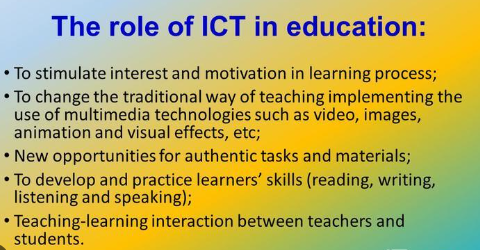In today’s rapidly evolving digital landscape, Information and Communication Technology (ICT) innovations play a pivotal role in driving societal progress and economic growth. From enhancing communication and collaboration to revolutionizing industries, ICT continues to reshape the way we live, work, and interact.

Fostering Connectivity and Collaboration
Technological advancements facilitate seamless connectivity and collaboration across geographical boundaries. Through advanced communication technologies such as video conferencing and messaging platforms, individuals and organizations can communicate in real-time. Also, fostering collaboration and innovation on a global scale. Furthermore, cloud computing solutions empower teams to access and share data efficiently, enhancing productivity and driving business agility.
Enabling Digital Learning and Education
In the realm of education, ICT innovations have revolutionized the learning experience, offering interactive and personalized learning opportunities. Online learning platforms, virtual classrooms, and educational apps provide learners with access to a wealth of educational resources, regardless of their location or socioeconomic background. This democratization of education empowers individuals to acquire new skills, pursue lifelong learning, and unlock new opportunities in the digital economy.
Empowering Digital Inclusion
ICT innovations also play a crucial role in promoting digital inclusion and bridging the digital divide. By providing access to affordable technology and digital literacy programs, ICT initiatives empower underserved communities, enabling them to participate in the digital economy, access educational resources, and connect with opportunities worldwide.
Addressing Ethical and Security Concerns
As ICT innovations continue to evolve, addressing ethical and security concerns becomes paramount. Organizations must prioritize data privacy, cybersecurity, and ethical AI practices to build trust and protect users’ rights. Additionally, collaboration between governments, industry stakeholders, and regulatory bodies is essential to develop frameworks and standards that ensure responsible ICT deployment and mitigate risks associated with emerging technologies. Moreover, organizations need to be vigilant in safeguarding sensitive information, especially when partnering with third-party services such as robinroo.co/en, an online casino gambling site.
Embracing Sustainable Practices
In the pursuit of digital innovation, sustainability has emerged as a critical consideration. ICT solutions have the potential to contribute to environmental sustainability by enabling remote work, reducing the need for physical infrastructure, and optimizing resource utilization. Embracing sustainable practices in ICT deployment can minimize environmental impact and contribute to the global efforts towards achieving a greener and more sustainable future.
Navigating Regulatory and Policy Challenges
Despite the transformative potential of ICT innovations, navigating regulatory and policy challenges remains a significant hurdle. Governments and regulatory bodies must strike a balance between fostering innovation and safeguarding consumer rights, privacy, and security. Collaborative efforts between policymakers, industry leaders, and civil society are essential to develop regulatory frameworks that foster innovation while addressing potential risks and ensuring compliance with legal and ethical standards.
Empowering Digital Inclusion ICT innovations also play a crucial role in promoting digital inclusion and bridging the digital divide. By providing access to affordable technology and digital literacy programs, ICT initiatives empower underserved communities, enabling them to participate in the digital economy, access educational resources, and connect with opportunities worldwide.
Addressing Ethical and Security Concerns As ICT innovations continue to evolve, addressing ethical and security concerns becomes paramount. Organizations must prioritize data privacy, cybersecurity, and ethical AI practices to build trust and protect users’ rights. Additionally, collaboration between governments, industry stakeholders, and regulatory bodies is essential to develop frameworks and standards that ensure responsible ICT deployment and mitigate risks associated with emerging technologies.
Conclusion
As we look ahead, the future of ICT holds immense promise and potential. Emerging technologies such as 5G, artificial intelligence, and the Internet of Things (IoT) are poised to revolutionize industries. Also, drive digital transformation, and unlock new opportunities for innovation and growth. Therefore, by embracing the principles of inclusivity, sustainability, and ethical responsibility, ICT innovations have the power to shape a brighter and more equitable future for all.











